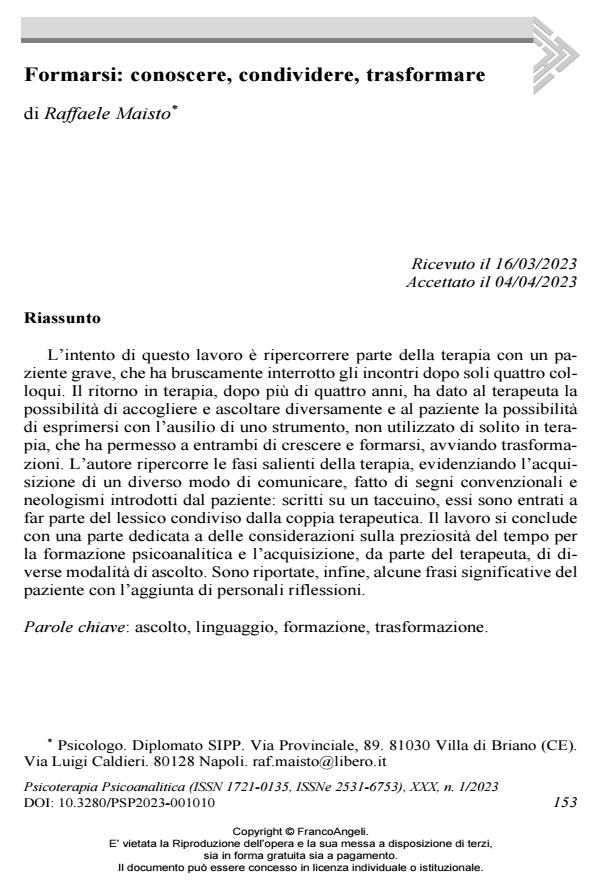Training: knowing, sharing, transforming
Journal title PSICOTERAPIA PSICOANALITICA
Author/s Raffaele Maisto
Publishing Year 2023 Issue 2023/1 Language Italian
Pages 11 P. 153-163 File size 232 KB
DOI 10.3280/PSP2023-001010
DOI is like a bar code for intellectual property: to have more infomation
click here
Below, you can see the article first page
If you want to buy this article in PDF format, you can do it, following the instructions to buy download credits

FrancoAngeli is member of Publishers International Linking Association, Inc (PILA), a not-for-profit association which run the CrossRef service enabling links to and from online scholarly content.
This article aims to retrace part of the therapy with a seriously ill pa-tient, who abruptly interrupted the appointments after only four inter-views. Returning to therapy, after more than four years, gave the ther-apist the opportunity to listen in a different way and gave the patient the opportunity to express himself with the help of a tool, not usually used in therapy, which allowed both to grow and train, initiating trans-formations. The author traces the salient phases of the therapy, high-lighting the acquisition of a different way of communicating, made up of conventional signs and neologisms introduced by the patient: written in a notebook, they became part of the lexicon shared by the therapeu-tic couple. The article concludes with a part dedicated to considerations about the preciousness of time for psychoanalytic training and for the acquisition, by the therapist, of different ways of listening. Finally, some significant sentences of the patient are reported with the addition of personal reflections.
Keywords: listening, language, training, transformation.
- Ferro A. (1996). Nella stanza di analisi. Milano: Raffaello Cortina.
- Ferro A. (2007). Evitare le emozioni, vivere le emozioni. Milano: Raffaello Cortina.
- Freud S. (1899). L’interpretazione dei sogni. OSF, 3.
- Pirandello L. (1926). Uno, nessuno e centomila. Milano: Mondadori, 2002.
- Winnicott D. (1953). Oggetti transizionali e fenomeni transizionali. In Gioco e realtà. Roma: Armando, 2006.
- Winnicott D. (1968). L’uso dell’ oggetto e l’entrare in rapporto attraverso identificazioni. In Gioco e realtà. Roma: Armando, 2006.
- Winnicott D. (1971). Il gioco. Attività creativa e ricerca del sé. In Gioco e realtà. Roma: Armando, 2006.
- Winnicott D. (1971). Il luogo in cui viviamo. In Gioco e realtà. Roma: Armando, 2006.
Raffaele Maisto, Formarsi: conoscere, condividere, trasformare in "PSICOTERAPIA PSICOANALITICA" 1/2023, pp 153-163, DOI: 10.3280/PSP2023-001010